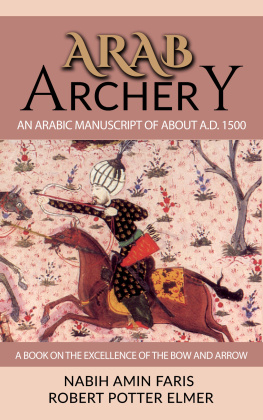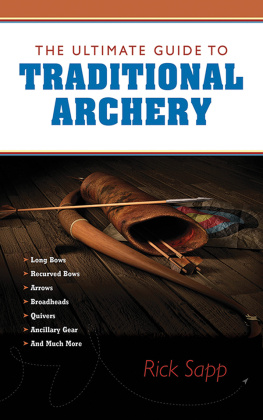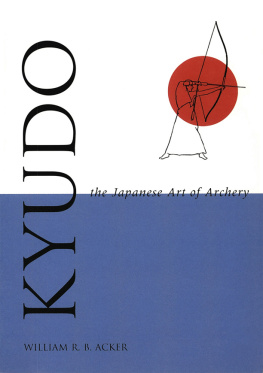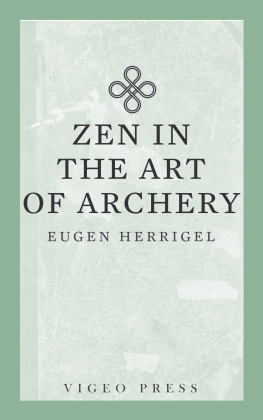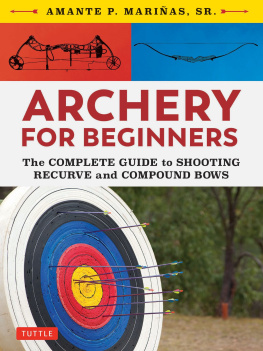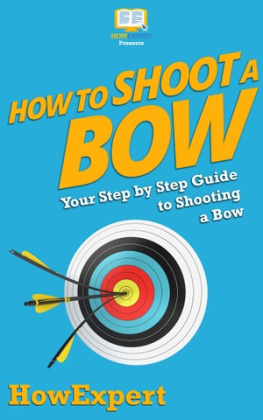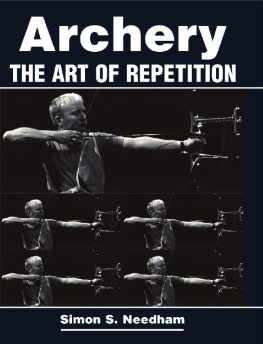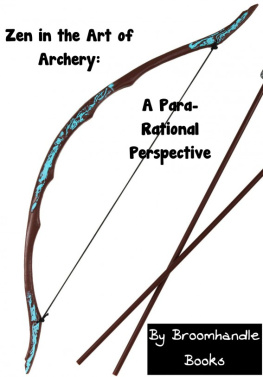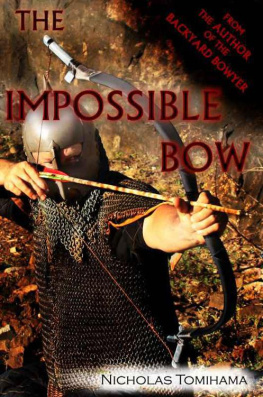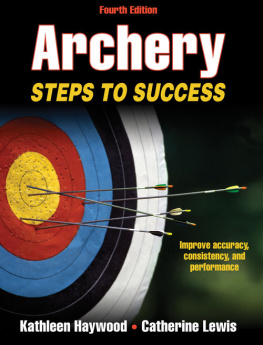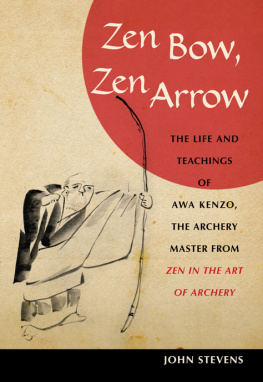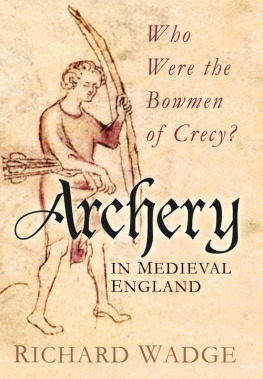CONTENTS
Arab Archery
An Arabic Manuscript of about A.D. 1500
A Book on the Excellence of the Bow and Arrow
Translation by Nabih Amin Faris, Robert Potter Elmer
Edition 2019 by David De Angelis
All rights reserved
PREFACE
THE translation and editing of this manuscript has been a joint enterprise undertaken by two men, one of whom started with great interest in Arabic studies and virtually no knowledge of archery, the other familiar with archery but without special training or experience in the Oriental field. We feel that each of us has helped expand the knowledge and interests of the other, and it is our hope that this book will be read by both kinds of readers, and with similar results.
In the Garrett Collection of Arabic Manuscripts in Princeton University Library is what appears to be a unique manuscript on archery. As works on sports in this collection are not numerous, this one attracted special attention. Faris thought of publishing the work but was dissuaded by his unfamiliarity with archery either in theory or practice. In 1940, however, he wrote an article on the Garrett Collection for the Princeton University Library Chronicle, and in the course of it referred casually to this manuscript. This article fell into the hands of Elmer, whose interest in archery is well known. He was so eager to have the work made available in English that he offered to supply the technical advice if Faris would do the translation.
We set about the task together, following a theoretical division of labor but actually carrying forward what in all truth proved to be a joint enterprise-for instance Elmers technical knowledge frequently furnished the key to difficult linguistic problems, while Fariss reading of Arabic often gave the answer to technical questions that have intrigued and mystified students of archery for many years.
The manuscript itself comprises 353 pages, 19 x 13.5 cm., with a written surface of 13 x 8 cm. The paper is glazed European of the fifteenth century. Unfortunately the identity of the author remains unknown, although we know from references in the body of the manuscript that he was a North African from Morocco.
Almost the only source of detailed knowledge of early English archery is Toxophilus, or the Schole of Shootynge, which was written by Roger Ascham in 1542 and 1543 and was published in 1544. Arab Archery is nearly contemporary with that famous book-probably preceding it by a few years-and may be considered to be on an equal plane of merit. This ancient Arabic manuscript is the only treatise on the archery of the medieval Orient that has been translated into English. It is thorough and authoritative, evidently the work of an expert bowman. A vast amount of information concerning the long-range artillery, by which one eastern empire after another had been won, is here brought forth into full light after having lain hidden for centuries.
It could be used as a textbook on archery today.
NABIH AMIN FARIS
AND
ROBERT POTTER ELMER
I. In the Name of God the Merciful, the Compassionate
THERE is no way unto God but through Him, God alone. May the blessing of God be upon our Lord Muhammad and upon His Family and Companions. Thanks be to God whose bounties upon His creatures are perfect and complete, and whose wisdom is evident in His creation throughout the world, who has made all without any previous pattern, and endued His work with utility; faultless and precious. He has made marksmanship the undoing of the enemy in war and, in raids, the means of victory over the foe; and has promised a high rank in Paradise to him who shoots an arrow in His cause, regardless of whether the archer fells an enemy or misses the mark.
I thank God for granting me mastery over the minute details of archery, and for giving me skill in its difficult technique; for its secrets which He has revealed unto me, and its mysteries which, through His grace, He unveiled to me. With His praise every matter of importance is commenced. And may the blessing of God be upon our Lord, Muhammad, His prophet, for through invoking Gods blessing upon him is every deed deduced and every statement formulated. I also thank God for His benefits and bounties which He grants unto us, even before we beseech His grace. Furthermore I testify that there is no god but God, He alone, no associates has He, and that Muhammad is His servant and apostle: a testimony of one aware of its necessity and cognizant of its obligation.
Holy War is one of the best forms of worship, and is obligatory upon every believer individually, though it has now become incumbent on the whole community collectively. Furthermore, the Holy Koran and the tradition have dwelt upon its excellence, thereby urging every Moslem to seek, through it, the martyrs crown. The Apostle of God said: By him who holds in His palm Muhammads life, it is my desire to meet my end on the battleground of God, and be brought back to life, and die again, and again, and yet again. According to another version: Would that I were given to die on the battleground of God, and be brought back to life, only to die again, and yet again, fighting His battles. AbuHurayrah was wont to say: Of every single year, three months belong to God and His cause. The Prophet also said: Of all the godly men who desire to be brought back to life, only the martyrs are granted their request. God also has enjoined us to prepare force against the polytheists in order to strike terror in their hearts, and pointed to us the excellence of the bow and arrow as implements of war. Thus He said: Make ready against them what force ye can, and strong squadrons whereby ye may strike terror into the enemy of God and your enemy. In urging that force be made ready against the enemy, God has indicated the importance of drilling and training in the use of all implements of war, in order to acquire skill, gain proficiency, obtain adroitness, and develop facility in their use. Furthermore, the Apostle pointed out that of all the instruments of war, the bow and arrow are the most effective and the greatest.
The Prophet also said: The hand of man has wielded no weapon which was not excelled by the bow. Is there anything more excellent than a man who has mastered marksmanship, who picks up his bow and showers the polytheists with his arrows? The crowds fear him, and the brave knights stand in awe before him. Many a weak city has been defended by a single archer, and many an army has been disbanded and scattered with a single arrow. During the battle of Uhud, the Apostle addressed Sad ibn-abi-Waqqas, abu-Talhah, and Qatadah ibn-al-Nu`man, who stood by him defending him with their bows and arrows, while most of his Companions fled away Stand firm; victory shall remain ours so long as ye stand firm. Indeed this is a great tribute to the bow and arrow and a compliment for their service. He that wields them will most certainly be victorious. How then could a sane Moslem place his confidence in any other weapon, or dare face his adversary with any other instrument of war?
The poet said
Bows, with the strings of which victory is bound;
In praise of their excellence the Scriptures resound .
Said another
If glory be to slay the foe,
Tis best to use the fastest throw,
And loose the arrow from the bow.
Furthermore, the bow and the arrow are the most effective and devastating of the instruments of war despite the fact that they are the least cumbersome to carry and use. Unfortunately, however, there are very few contemporaries who can use the Arab bow and fewer still who know anything about its methods and technique. For this reason I decided to write a book on marksmanship and the use of the Arab bow. Such a book I had, in fact, written and entitled it Kifayat al-Muqtasid al-Basir fi al-Ramy an al-Qaws al-`Arabiyah bi-al-Sahm al-Tawil w-al-Qasir [The Sufficiency of the Discerning Student: on Shooting with the Arab Bow with the Long Arrow and the Short]. It was, however, too brief, and the need for a detailed and comprehensive work on the subject was still felt. Consequently, I set out to fulfil this need. This book is the result. Verily God is my refuge and my trust.
Next page
